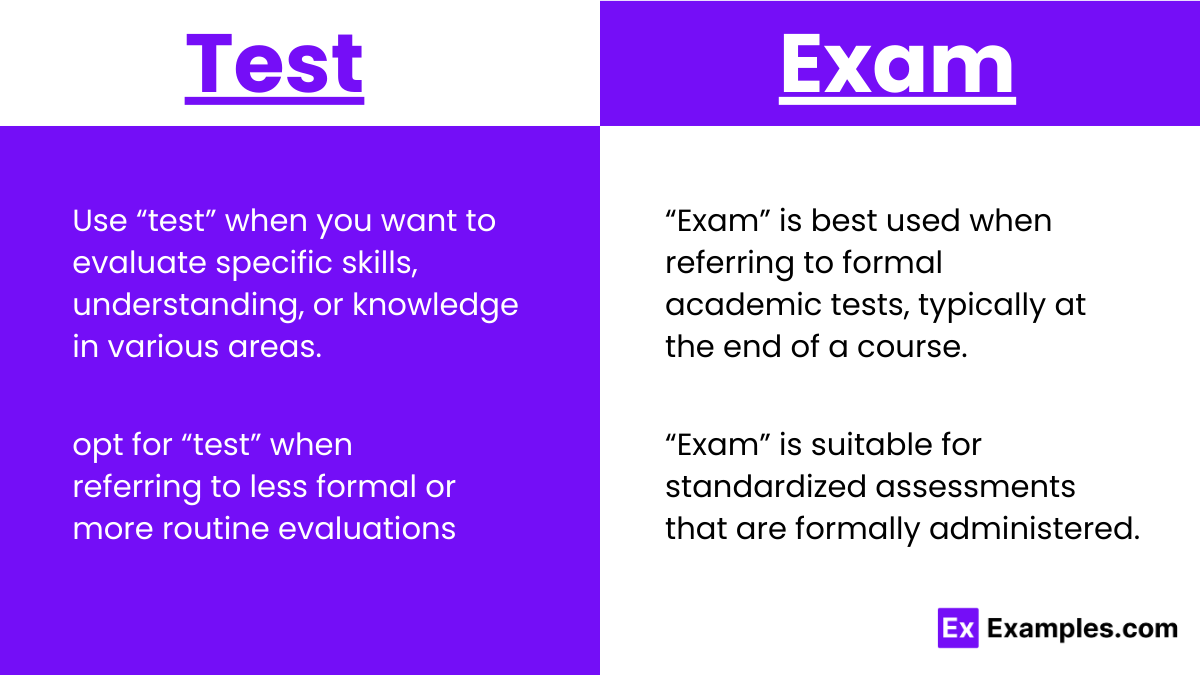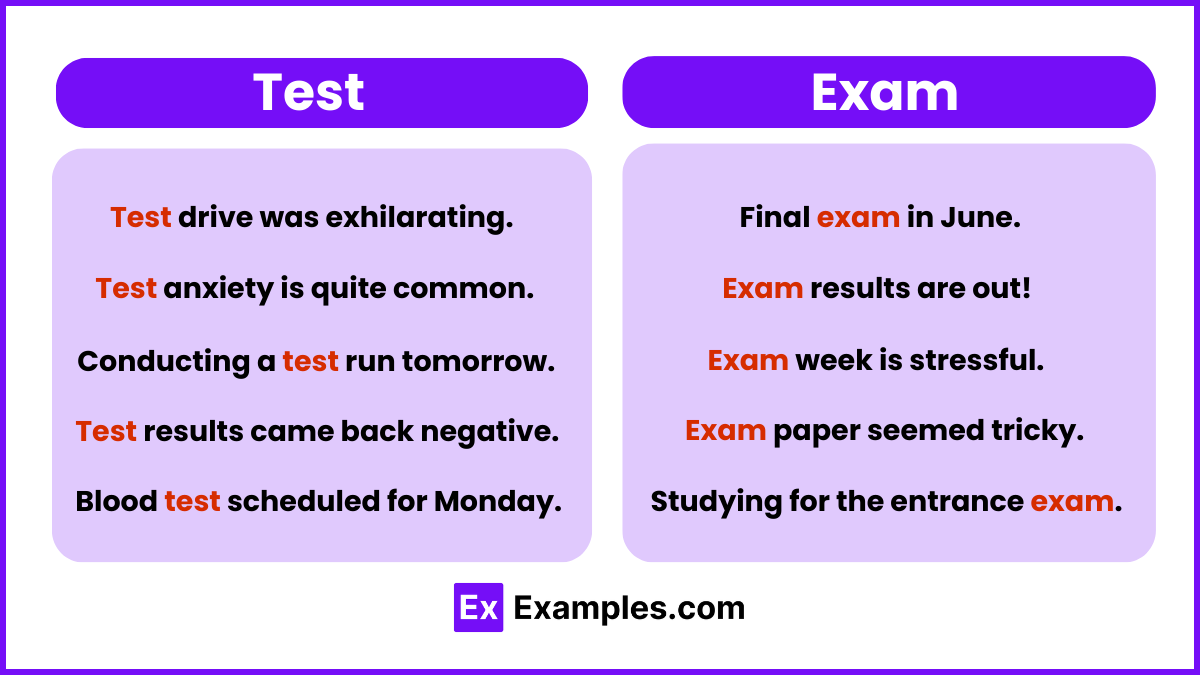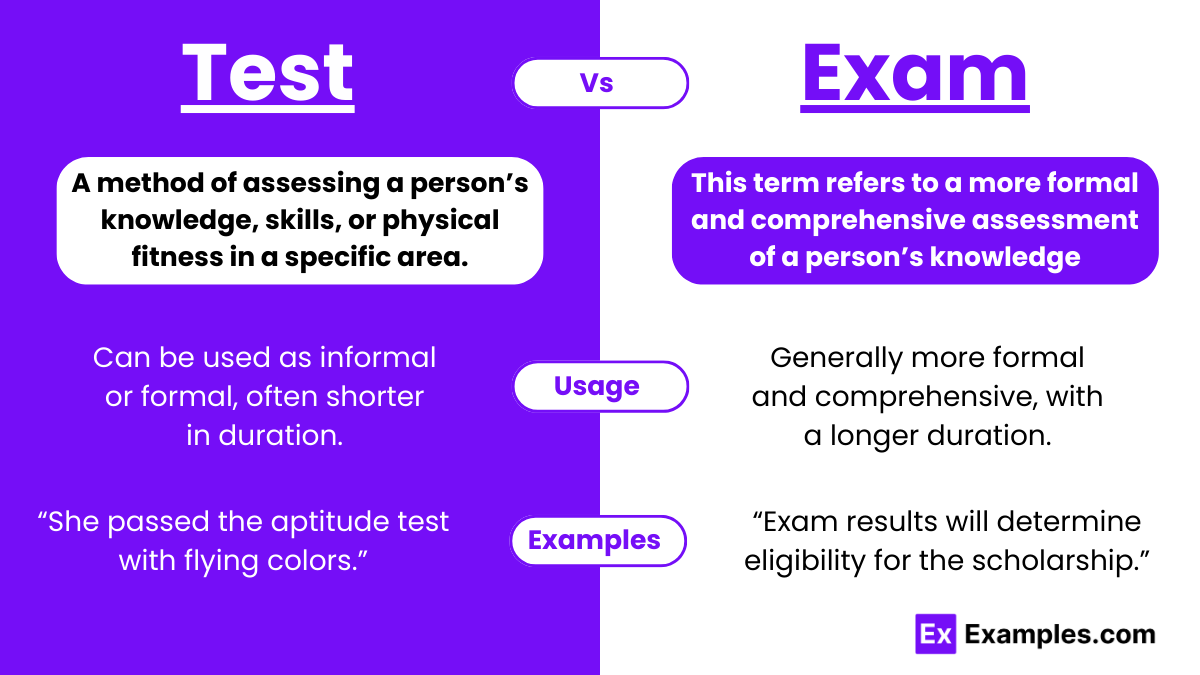Test vs Exam – Meanings, Difference, Examples, Usage
In education, “test” and “exam” are terms used to check how well students understand their subjects. Though they sound similar and both involve asking questions to grade students, there’s a small difference. An exam is usually more formal and covers more material than a test. For educators and course creators, understanding and applying these evaluations is crucial for gauging the effectiveness of teaching methodologies and the learners’ progress. While “test” and “exam” are frequently used interchangeably and both serve the fundamental purpose of measuring student knowledge through a series of questions and graded responses, they encapsulate subtle distinctions that can influence the approach and perception of academic assessments.
Test and Exam – Meanings
- Test: A method of assessing a person’s knowledge, skills, or physical fitness in a specific area. Tests can range from informal quizzes to formal assessments and are used to gauge understanding, proficiency, or capability in a variety of contexts. The term often implies a shorter, more focused assessment compared to an exam.
- Exam: Short for “examination,” this term refers to a more formal and comprehensive assessment of a person’s knowledge or skills in a particular subject or field. Exams are typically longer and more detailed than tests, and they are often used as significant benchmarks in educational or professional certification processes.
Summary
Both “test” and “exam” are used in educational and professional settings to evaluate knowledge, skills, or fitness. The key difference lies in their scope and formality: a “test” is generally shorter and can be less formal, often used for quick assessments or quizzes. An “exam” is more comprehensive and formal, used for major assessments that may determine academic progression or professional certification.
How to Pronounce Test and Exam
- Test: Pronounced as /tɛst/, this one-syllable word is straightforward, with a crisp “t” sound at both the beginning and end, emphasizing the act of assessing or measuring proficiency.
- Exam: Pronounced as /ɪɡˈzæm/, this word starts with a soft “e” sound, followed by a more emphasized “-zam” at the end, highlighting its nature as a more extensive assessment.
Differences between Test and Exam
| Aspect | Test | Exam |
|---|---|---|
| Formality | Can be informal or formal, often shorter in duration. | Generally more formal and comprehensive, with a longer duration. |
| Frequency | Can be administered more frequently to monitor progress. | Often held at key points in a course or program, such as the end of a term. |
| Purpose | Used for quick assessments, quizzes, or practice. | Used for major evaluations, determining grades, or certification. |
| Stress Level | Often perceived as less stressful due to lower stakes. | Can be more stressful due to its significance in academic or professional contexts. |
How to Remember the Difference between Test and Exam
The key to differentiating “test” from “exam” lies in the context and gravity of the assessment. Think of “tests” as checkpoints or practice runs—useful for quick assessments and regular feedback. On the other hand, envision “exams” as major milestones or finals, where the stakes are higher, and the assessment is more comprehensive.
When to Use Test and Exam

Usage of Test
- Assessing Skills or Knowledge: Use “test” when you want to evaluate specific skills, understanding, or knowledge in various areas, not just academic. It’s applicable in situations ranging from educational assessments to measuring proficiency in a particular skill.
- Medical and Technical Diagnostics: The word “test” is appropriate for referring to medical screenings, diagnostic evaluations, or technical checks. For example, a blood test to determine health conditions or a software test to assess functionality.
- Less Formal Assessments: opt for “test” when referring to less formal or more routine evaluations that may not carry the weight of a final examination, such as a quiz or a practice test to gauge ongoing understanding.
- Verbal Action: Use “test” as a verb when you want to describe the action of conducting an assessment or evaluation. For instance, testing a hypothesis in a science experiment or testing a student’s grasp of a concept through oral questions.
Usage of Exam
- Formal Academic Settings: “Exam” is best used when referring to formal academic tests, typically at the end of a course or semester, to assess a student’s comprehensive understanding of the subject matter.
- Certification and Qualification: Use “exam” when discussing tests that are part of professional certifications, qualifications, or licensing processes. This could include bar exams for lawyers, board exams for doctors, or certification exams for various professions.
- High-Stakes Testing: Choose “exam” for tests that have significant consequences or are pivotal in determining one’s progression, such as entrance exams for universities or final exams that decide course completion and grades.
- Standardized Testing: “Exam” is suitable for standardized assessments that are formally administered and scored, such as the SAT, ACT, or GRE. These exams are structured and standardized across different test-takers to ensure uniformity in assessment criteria.
How to Use Test and Exam
Using “Test”
As a Noun
- A “test” refers to a method of assessing abilities, performance, or quality in various contexts, not just academic.
- Example: The driving test is a critical step towards obtaining a license.
As a Verb
- When used as a verb, “test” means to subject someone or something to a procedure designed to assess its qualities or performance.
- Example: The teacher decided to test the students’ understanding with a pop quiz.
Using “Exam”
As a Noun
- “Exam” is short for “examination” and refers specifically to a formal test of knowledge, especially in an academic setting.
- Example: The final exam will cover all the topics we’ve discussed this semester.
Test and Exam – Examples

Examples of Test
- “The weekly vocabulary test helps students retain new words.”
- “The driving test includes both a written quiz and a practical evaluation.”
- “She passed the aptitude test with flying colors.”
Examples of Exam
- “Students spent weeks preparing for their final exams.”
- “The certification exam for network engineers is notoriously difficult.”
- “Exam results will determine eligibility for the scholarship.”
Synonyms
| Term | Synonyms |
|---|---|
| Test | Quiz, assessment, evaluation |
| Exam | Examination, final, assessment |
Exercise
Fill in the blanks with either “test” or “exam” to complete the sentences accurately.
- The biology _______ at the end of the semester will cover all chapters from the textbook.
- Regular spelling _______ help students improve their writing skills.
- The recruitment process includes a skills _______ to gauge applicants’ proficiency.
- Students often feel anxious about the mid-term _______ due to its impact on their grades.
- The instructor uses pop _______ as a way to encourage consistent study habits.
Answers
- exam
- tests
- test
- exam
- tests
FAQ’S
Is an Exam Just a Test?
An exam is a formal test, often comprehensive, marking significant academic or professional milestones.
What is the Difference Between Test and Testing?
“Test” is a noun for the evaluation, while “testing” is the verb, the act of conducting the evaluation.
What’s the Difference Between a Test and an Assessment?
A test is specific and scored, while an assessment is broader, evaluating overall performance and understanding.
Is it Correct to Say Take a Test?
Yes, “take a test” is a common and correct phrase used to describe the act of undergoing an evaluation.
Do Americans Use the Word Exam?
Yes, Americans use “exam” for more formal tests, especially in higher education and professional certifications.


